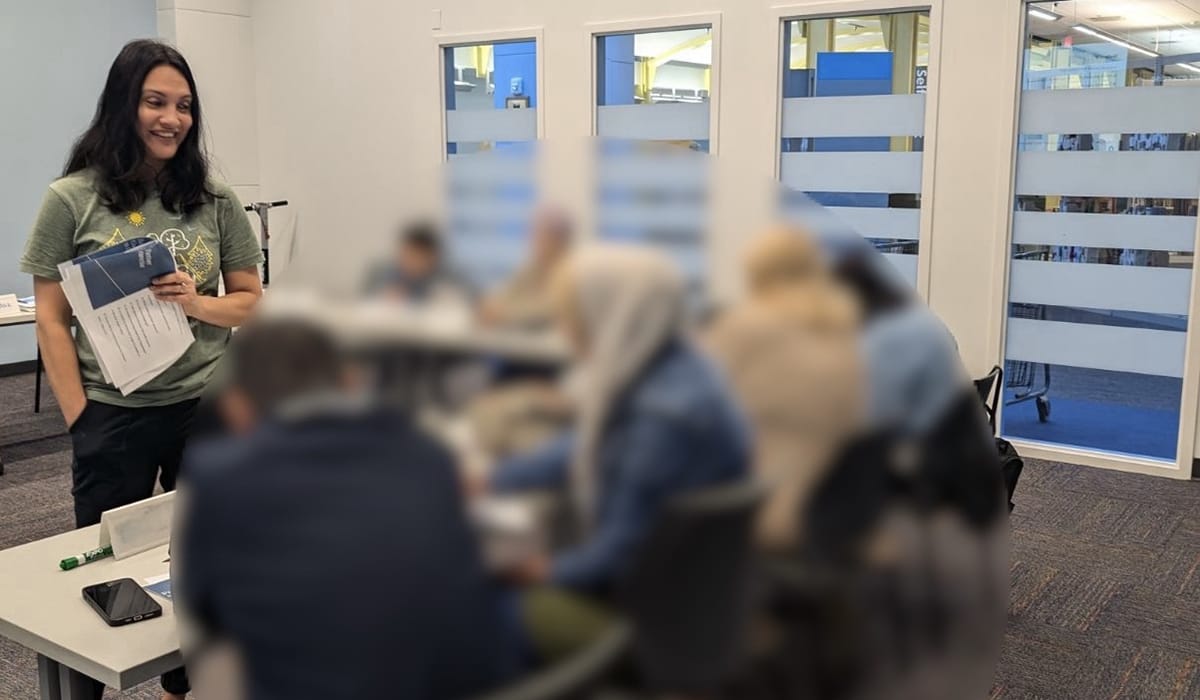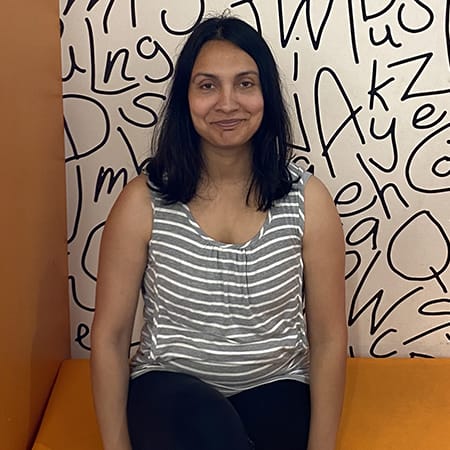Building Confidence through a Universal Language

Meet Daily Point of Light Award honoree Madhavi Menon. Read her story, and nominate an outstanding volunteer or family as a Daily Point of Light.
Madhavi Menon co-teaches an English Language Learner beginner class at Johnson County Library in Overland Park, Kansas. Since September 2022, Madhavi has taught these classes each Saturday alongside her co-teaching partner, Jessica Kueker.
The duo has served over 200 hours while creating lesson plans and facilitating classes.
As a naturalized U.S. citizen, Madhavi understands the challenges of being an immigrant in a new country. From her experiences, she finds joy in helping other immigrants learn the English language and integrate into American culture. Madhavi enjoys challenging her students with consistent coursework to help them achieve their English dialogue goals.
Read on to learn about Madhavi and her volunteer service.

What inspires you to volunteer?
For a couple of years, I looked for different ways to get engaged within the community through various programs and volunteer opportunities. This program resonated with me because I’m an immigrant myself, and I could understand how difficult it must be to come to a new country that is not only culturally different but also unable to speak the language. This was one way I could contribute: to help everyone learn English and acclimate to the United States.
Tell us about your volunteer role with Johnson County Library.
I am a volunteer teacher with the English Language Learners program. Two of us teach this class together on Saturday mornings for an hour and a half. During that time, I meet with 12 to 15 students a semester averaging approximately 48 to 60 students a year. Before each class, we develop a teaching plan that allows me to put together slides and other materials we want to cover.
What does your weekly curriculum entail?
The teaching involves many exercises. We cover different topics, such as things that would be helpful in everyday life: schools, the city, the doctor’s office, the post office, the function of a hospital and others.
At times, I put students into pairs and say, “Okay, let’s pretend that you’re a pedestrian on the street and you’re just passing by someone, you need directions to someplace and you have a conversation.” This helps them build on filling in the blanks and also reading comprehension.
What are some challenges you have faced while teaching the English language?
One of the challenges I faced was developing a teaching plan. I don’t have a background in teaching, but with practice, I learned how to develop a plan and execute it, and I have gotten better at that over time. We improve our teaching styles and techniques by practicing and receiving feedback from students.
It’s getting people to a place where they’re accepting and comfortable with their learning. It can be challenging, but it’s ultimately rewarding. My job is to learn how to better serve our students, which happens over time.
What benefits do you feel your students have gained from your lessons?
One of the short-term benefits is more confidence in speaking. It’s amazing to hear how they have improved in sentence construction and in their ability to read and understand.
In the long term, it’s also just about feeling like you belong and have a group. You know, you’re coming together with a group with the same goal, objective and purpose and feeling more settled.
A benefit of teaching is forming connections with our students, especially those who have been with us for a long time. Teaching helps build a community in the library, not only for the students but also for other community members.
What are your long-term plans or goals for teaching the English language, and what else would you do in addition to this?
As of now, we will continue doing what we’re doing. We’re getting an excellent response from the community. We have sessions focused on the English language class every semester, broken into different semesters. I plan to continue volunteering to build momentum and engage more people with the program.
The hope is to spread the word and encourage people to come in, learn and participate.
If I had the time, I could work with kids on storytelling and reading in the community. I would want to join a larger community reading group and watch as the community continues to develop. But it would be nice to be able to include a lot of kids who may not necessarily have access outside or may have very busy parents.
What’s been the most rewarding part of your work?
The most rewarding part of my work is engaging with adults from different places, watching someone learn something new and express themselves. Observing them transform from being unable to construct sentences to seeing them speak very well is remarkable. Also, meeting people from so many different countries and places, learning more about their cultures and understanding why they’ve come here helps build that community locally.
Why should others get involved with causes they care about?
There’s something to be said for that human connection; it’s a lot of fun. We have a lot of fun in the classroom while we build a small community, and so by adding that human element to it, you can make a big difference. Being able to make a difference in a collaborative environment is lifechanging. If anyone feels like they want to do something and volunteer, they totally should and not worry about it.
Any advice for people who want to start volunteering?
Do it. Just do it. Don’t worry about whether you have the background or skills needed. People will be so grateful that you’re just there, doing it because there’s always a need.
Do you want to make a difference in your community like Madhavi? Find local volunteer opportunities.